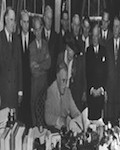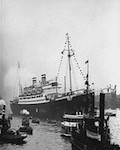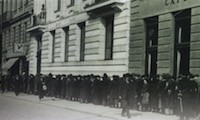Proposals by refugee advocates to bring European Jews to the United States during World War II were often rejected by Roosevelt administration officials on the grounds that ships were not available. One official told Congressman Emanuel Celler in 1943 that to rescue Jews, the U.S. would have to “divert shipping for the transportation of war materials and troops for the refugees.”
Yet it was no secret that American troop-supply ships were returning to the United States empty. An editorial in the Baltimore Jewish Times in 1943 pointed out that the empty ships were “frequently going out of their way to find ballast” to weigh them down on their return trips to the United States, so t at they would not capsize. It also noted that the Allies had managed to find ships to bring tens of thousands of Polish refugees to Iran, Uganda, and Mexico—“the very ships [that] all the apologists for failure to aid the Jewish refugees denied were available.” The Allies had also found enough boats to take 20,000 Muslims from Egypt to Mecca, for a religious pilgrimage, in 1944.
New Yorkers were particularly aware of the ballast phenomenon. U.S. ships returning from bringing troops and supplies to England weighed themselves down with tons of rubble from the bombed-out city of Bristol, which was dumped in the harbor on the southeast shore of Manhttan. The spot was eventually formally designated as Bristol Bay, and much of the rubble was used to build the lower portion of the FDR Drive, along Manhattan’s eastern edge. The Bergson Group took note of this activity and in 1943 published an editorial in its magazine, The Answer, arguing that if the ships were bringing back rubble as ballast, they could just as easily bring back Jewish refugees.
Freda Kirchwey, editor of The Nation, raised the shipping issue in a 1944 editorial urging a U.S. response to the deportation of Hungary’s Jews to death camps. Specific steps were needed, she argued: “The first need is the immediate establishment of ports of asylum….The second need is means of transportation….Troopships which have delivered their loads at Mediterranean ports could be diverted for a single errand of mercy.”
However, the Roosevelt administration consistently refused to give serious consideration to such proposals.
Sources: Wyman, The Abandonment of the Jews, pp. 113-116, 335-336, 342-343; Medoff, FDR and the Holocaust, pp.10, 58, 145.











